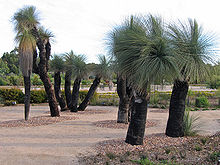| Kingia | |
|---|---|

| |
| Stand of Kingia cultivated at a garden | |
| Scientific classification | |
| Kingdom: | Plantae |
| Clade: | Tracheophytes |
| Clade: | Angiosperms |
| Clade: | Monocots |
| Clade: | Commelinids |
| Order: | Arecales |
| Family: | Dasypogonaceae |
| Genus: | Kingia R.Br. |
| Species: | K. australis
|
| Binomial name | |
| Kingia australis | |
Kingia is a genus consisting of a single species, Kingia australis, and belongs to the plant family Dasypogonaceae. The Aboriginal name bullanock is used as a common name for the plant. It has a thick pseudo-trunk consisting of accumulated leaf-bases, with a cluster of long, slender leaves on top. The trunk is usually unbranched, but can branch if the growing tip is damaged. Flowers occur in egg-shaped clusters on the ends of up to 100 long curved stems. Kingia grows extremely slowly, the trunk increasing in height by about 1½ centimetres per year. It can live for centuries, however, so can attain a substantial height; 400-year-old plants with a height of six metres are not unusual.